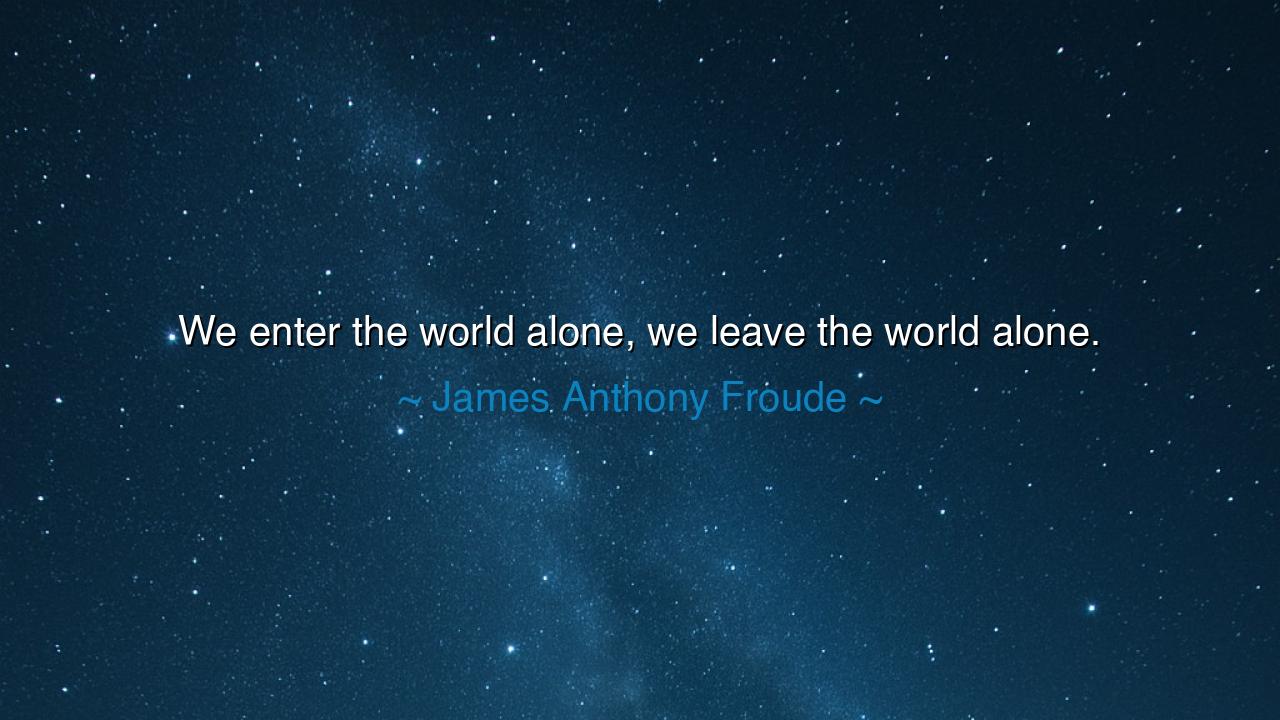
We enter the world alone, we leave the world alone.






"We enter the world alone, we leave the world alone." These words by James Anthony Froude resonate with a profound truth about the solitary nature of human existence. From the moment of our birth to the moment of our death, we experience life in a deeply personal, singular way. Froude’s reflection speaks to the individual journey of the soul, one that begins and ends in solitude. Though we may be surrounded by others at various points in our lives, the most fundamental experiences—birth and death—are events that each soul must face on its own. This existential truth calls us to understand that while relationships and community are essential to our experience, we ultimately carry the weight of our existence alone.
The ancient philosophers often spoke of solitude and self-reliance as essential elements of the human condition. The Stoics, for example, taught that true peace and freedom come not from external circumstances, but from an internal strength that can only be built in solitude. Epictetus urged individuals to focus on what is within their control—their own thoughts, actions, and reactions—and to accept that life and death are beyond human influence. For the Stoics, the understanding that we enter and leave life alone was a key to embracing both suffering and joy. Their teachings suggested that when we recognize the impermanence of life and the inevitability of death, we can live with a sense of purpose and clarity, unburdened by the fear of the unknown.
Similarly, the ancient Egyptians believed that life and death were part of an eternal cycle, and that the soul was destined to journey through these stages alone. The Book of the Dead, a text intended to guide the deceased through the afterlife, highlights the solitary journey of the soul as it travels through the realm of the dead. The Egyptians understood that no one could accompany the soul on its final journey—each person, regardless of their wealth or status, must face the afterlife alone. This ancient wisdom mirrors Froude’s sentiment: while we may be surrounded by others throughout our lives, we each stand alone at the threshold of birth and death, facing the unknown.
Consider the story of Alexander the Great, whose conquests brought him fame and glory, yet he faced his death in isolation. Despite being surrounded by soldiers, generals, and admirers, his final moments were marked by a profound solitude. Alexander, at the height of his power, could not control the most essential aspect of human existence—death. His body, once a vessel of strength and triumph, was laid to rest alone, symbolizing the truth that no matter how grand our lives may become, we all face the end on our own terms. His journey serves as a reminder that fame and acclaim cannot shield us from the inevitable solitude of our final moments.
Froude’s statement also brings attention to the loneliness that each person experiences on their journey through life. While we are born into families and communities, and often form deep connections with others, there are aspects of life that no one else can experience on our behalf. Emotions, thoughts, and the very sense of self are inherently individual. Even in the most intimate relationships, we must confront the fact that each person is, at their core, alone. This solitary nature of the human condition does not make life any less meaningful, but it calls us to embrace the uniqueness of our own existence, to accept that we must navigate our challenges and triumphs through our own actions.
The lesson in Froude’s words is one of acceptance and personal responsibility. Understanding that we enter and leave the world alone encourages us to take full ownership of our lives. We cannot rely solely on others for our happiness or fulfillment, nor can we expect others to carry us through life’s most difficult moments. We must cultivate our inner strength, recognize the solitude inherent in existence, and accept it as part of the human experience. By doing so, we are better able to live authentically, make decisions that reflect our true selves, and approach life with the bravery to face both its joys and its challenges with equanimity.
In our own lives, we must remember that self-reliance does not mean isolation, but rather the ability to find strength within. While we may walk this world in the company of friends, family, and loved ones, we must acknowledge that the most important journey is the one we take within ourselves. By embracing solitude, we can cultivate the clarity and resilience necessary to live with purpose and integrity. And when the time comes to face the end of this life, we will do so with a heart that understands the solitary nature of the journey, and the wisdom that self-awareness is the key to living fully and dying peacefully.
Thus, Froude’s reflection calls us to live fully and courageously, knowing that though we may face our trials and joys alongside others, we must ultimately own our path in life. Let us live in a way that honors both our individuality and our connections with others, accepting that the solitude we face in life and in death is not something to fear, but to understand as part of the human condition. It is in this understanding that we find true peace, for only when we accept our own solitude can we truly connect with the depths of life and embrace every moment with clarity and purpose.






AAdministratorAdministrator
Welcome, honored guests. Please leave a comment, we will respond soon